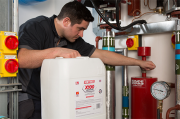Water treatment specialist, Sentinel Commercial, is urging building maintenance engineers to take advantage of planned shutdown periods to review water quality in boiler plants and implement any necessary chemical treatments, such as system cleaning and inhibitor dosing. These procedures, which can take several days or more to complete depending on the size and complexity of a system, are vital to the health of boilers and heating systems as a whole; those which do not receive adequate water treatment are likely to suffer from excess energy consumption, poor heat transfer, premature repairs and parts replacements, and breakdowns.
Water treatment specialist, Sentinel Commercial, is urging building maintenance engineers to take advantage of planned shutdown periods to review water quality in boiler plants and implement any necessary chemical treatments, such as system cleaning and inhibitor dosing. These procedures, which can take several days or more to complete depending on the size and complexity of a system, are vital to the health of boilers and heating systems as a whole; those which do not receive adequate water treatment are likely to suffer from excess energy consumption, poor heat transfer, premature repairs and parts replacements, and breakdowns. 
“Often, insufficient time is allocated for proper water treatment, and this can leave commercial heating systems vulnerable to a range of very serious and costly problems, including complete boiler failure and unexpected downtime. Planned shutdowns – such as during school holidays or for general refurbishments - represent the ideal opportunity for engineers to undertake programmes of best practice water treatment, thereby ensuring maximum protection and energy efficiency of those heating systems,” explained Chris Shelton, sales director of Sentinel Commercial.
Best practice water treatment, which comprises system cleaning, protection and maintenance, is able to deliver lifetime protection to boilers and heating system components through the prevention of corrosion – a phenomena which is otherwise inevitable. Limescale build-up (for systems located in hard water areas) can also be avoided. The benefits of best practice water treatment include optimal energy savings, heat transfer, and system longevity and performance, and meeting boiler warranty terms and conditions. Best practice water treatment is essential for both new and existing heating systems.
“Allocating adequate time for best practice water treatment is especially important when replacing boilers as the cleaning process to remove corrosion sludge, debris and other harmful foulants from older commercial heating systems can sometimes take a week or more. If it’s not undertaken correctly and contaminants remain in the circulating water, system performance, efficiency and reliability will remain poor. What’s more, the effectiveness of any subsequently dosed inhibitor will be compromised,” he said.
“The education sector, in particular, often schedules boiler replacements during summer holidays. The early application of a slower acting cleaner will facilitate a faster boiler replacement programme, ensuring that the existing system is cleaner and thus easier to work with.”
Water treatment shouldn’t just be limited to boiler replacements, however. Mr. Shelton advocates periodic assessment of system water quality to ensure adequate inhibitor concentration and cleanliness of system water. He says such checks, which are quick to carry out, not only evaluate the health and ongoing protection of a heating system but also help to identify any necessary maintenance and allow it to be undertaken in a convenient, controlled manner.
“Planned preventative maintenance is extremely important in the commercial sector, helping to limit downtime and maintain business continuity. By regularly checking system water, engineers can catch potential problems early and take the time to consult water treatment specialists on the best courses of action – which could be carried out during planned shutdowns. Ultimately, this approach helps to achieve lifetime system protection and optimal energy savings,” he concluded.